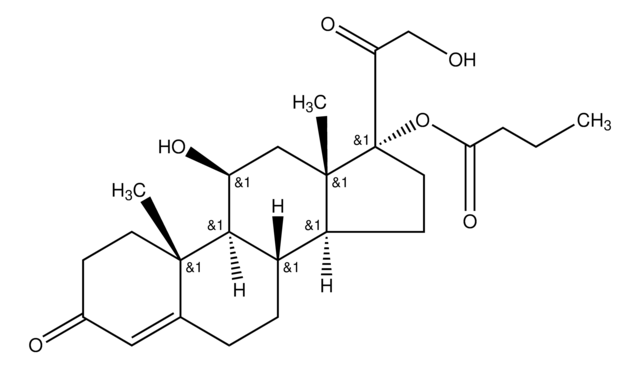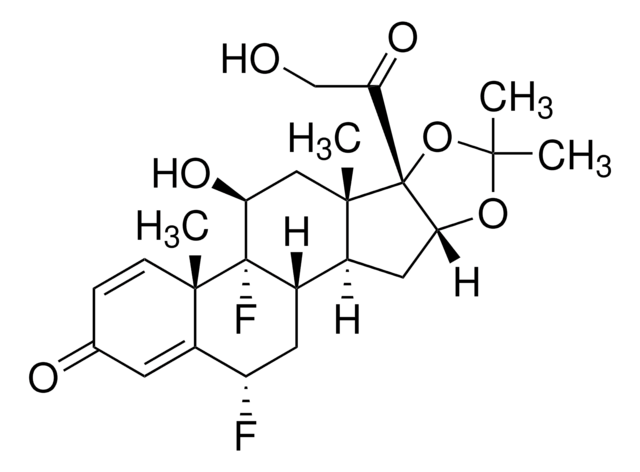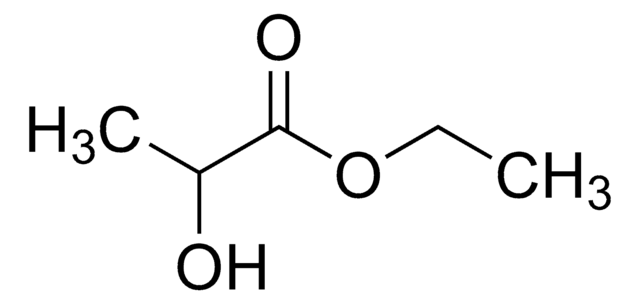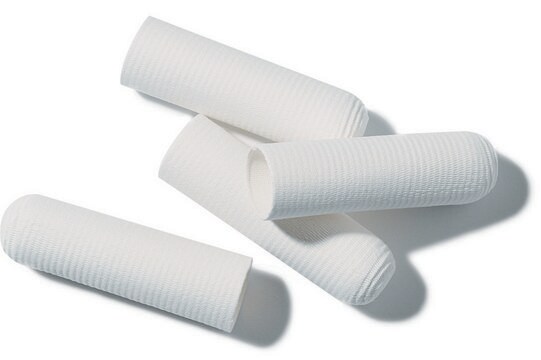1317007
USP
Hydrocortisone acetate
United States Pharmacopeia (USP) Reference Standard
Synonym(s):
Hydrocortisone 21-acetate, 11β,17α,21-Trihydroxy-4-pregnene-3,20-dione 21-acetate, 17-α-Hydroxycorticosterone acetate, 17-Hydroxycorticosterone 21-acetate, 21-Acetoxy-4-pregnene-11β,17α-diol-3,20-dione, 4-Pregnene-11β,17α,21-triol-3,20-dione 21-acetate
About This Item
Recommended Products
grade
pharmaceutical primary standard
API family
hydrocortisone
manufacturer/tradename
USP
mp
223 °C (dec.) (lit.)
application(s)
pharmaceutical (small molecule)
format
neat
SMILES string
[H][C@@]12CCC3=CC(=O)CC[C@]3(C)[C@@]1([H])[C@@H](O)C[C@@]4(C)[C@@]2([H])CC[C@]4(O)C(=O)COC(C)=O
InChI
1S/C23H32O6/c1-13(24)29-12-19(27)23(28)9-7-17-16-5-4-14-10-15(25)6-8-21(14,2)20(16)18(26)11-22(17,23)3/h10,16-18,20,26,28H,4-9,11-12H2,1-3H3/t16-,17-,18-,20+,21-,22-,23-/m0/s1
InChI key
ALEXXDVDDISNDU-JZYPGELDSA-N
Gene Information
human ... NR3C1(2908)
Looking for similar products? Visit Product Comparison Guide
General description
Application
Also, for use with USP monographs such as:
- Hydrocortisone Acetate Cream
- Hydrocortisone Acetate Lotion
- Hydrocortisone Acetate Ointment
- Neomycin Sulfate and Hydrocortisone Acetate Ointment
- Neomycin Sulfate and Hydrocortisone Acetate Ophthalmic Suspension
- Oxytetracycline Hydrochloride and Hydrocortisone Acetate Ophthalmic Suspension
- Neomycin and Polymyxin B Sulfates and Hydrocortisone Acetate Cream
Analysis Note
Other Notes
related product
Signal Word
Danger
Hazard Statements
Precautionary Statements
Hazard Classifications
Repr. 1B - STOT RE 2
Storage Class Code
6.1C - Combustible acute toxic Cat.3 / toxic compounds or compounds which causing chronic effects
WGK
WGK 3
Flash Point(F)
Not applicable
Flash Point(C)
Not applicable
Choose from one of the most recent versions:
Certificates of Analysis (COA)
Sorry, we don't have COAs for this product available online at this time.
If you need assistance, please contact Customer Support.
Already Own This Product?
Find documentation for the products that you have recently purchased in the Document Library.
Our team of scientists has experience in all areas of research including Life Science, Material Science, Chemical Synthesis, Chromatography, Analytical and many others.
Contact Technical Service






